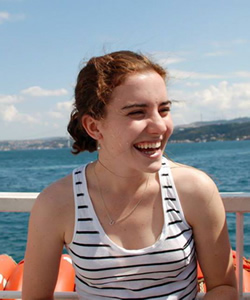After dinner, we followed the sounds of the music down to the harbor, where we found several hundred Alanyans crowded around a stage.
The enthusiasm was contagious. The sound system blasted the sharp sounds of the saz, and everyone knew all the lyrics to every song. Countless onlookers eagerly waved Turkish flags in the air; everyone danced and clapped to the beat. Someone in the crowd handed my friend a Turkish flag, so we joined in as well, waving the flag above our heads.
At one point, the crowd recited the powerfully nationalistic words of the Student Oath (Öğrenci Andı), something all Turkish children recited at school before the requirement was abolished several months ago:
I am Turkish, honest and hardworking. My principles are to protect the younger, to respect the elder, to love my homeland and my nation more than myself. My ideal is to rise, to progress.
Oh Great Atatürk! On the path that you have paved, I swear to walk incessantly toward the aims that you have set.
My existence shall be dedicated to the Turkish existence. How happy is the one who says, "I am a Turk!”
Immediately afterwards, the band started up a rousing number of the Turkish national anthem as fireworks exploded above the water.
“Iyi Cumhuriyet Bayramı!” the crowd chanted. “Happy Republic Day!”
The closest American equivalent to the holiday would be the Fourth of July, although this fierce patriotism seems to be something unique to Turkey. On Republic Day, the founder of the Turkish Republic himself, Atatürk, is particularly prominent. His legacy continues to loom largely over Turkey. The major boulevard in any city is almost always named Atatürk Caddesi after him, and practically every city or village has a town square with a statue of this founder of the Republic.
As such, the Republic has developed over the past 90 years under the gaze of Atatürk’s piercing blue eyes. Politicians and military generals have nurtured his legacy throughout the decades; the military evoked his name in the four coups it executed throughout the twentieth century.
In Turkey, nationalism is part of the daily political discourse. While the state plays an active role in the cultivation of this nationalism, the feeling runs deeper. The omnipresent Atatürk paraphernalia goes beyond state sponsorship—you can buy Atatürk earrings, Atatürk phone cases, and Atatürk notebooks.
The cult of personality that surrounds Atatürk is fascinating. Certainly, he can be credited with the incredible transition from the deteriorating Ottoman Empire to the modernized Turkish Republic. Whoever the man actually was, his charismatic memory continues to persist. It is this memory that shapes Turkish political discourse.
In my time in Turkey, I’ve been asked several times by Turks who are curious to know what I’ve learned about Atatürk, making sure that I have received the correct interpretation of his role in Turkish history.
“I love him,” one university student told me, patting his chest with the palm of his hand. “He made Turkey modern.”
“He saved women from having to wear a headscarf,” said a high school student in Alanya in a similar conversation.
Ninety years after the founding of the Republic, Atatürk’s memory remains strong in Turkey. While Kemalism may have lost its potency over the last decade under the AK Party, the adoration of Atatürk remains strong.
For decades, the Student Oath—as was recited at the Republic Day celebration I attended—served as a promotion of Turkish nationalism. “O Great Atatürk!” the pledge proclaims, finishing with the famous line from Atatürk’s speech in 1933: “How happy is the one who says, ‘I am a Turk!’”
Yet last September, Prime Minister Recep Tayyip Erdoğan abolished the practice of reciting the Student Oath, as part of a larger set of reforms. Perhaps the abolition of the oath suggests that Turkey is opening up to the idea that there are other groups besides Turks within its borders—the Kurds, for example. Currently, Turkey is at a crossroads, as it determines its identity for the next 100 years of the Republic.
Until then, I’ll be keeping tabs in my Atatürk notebook.

